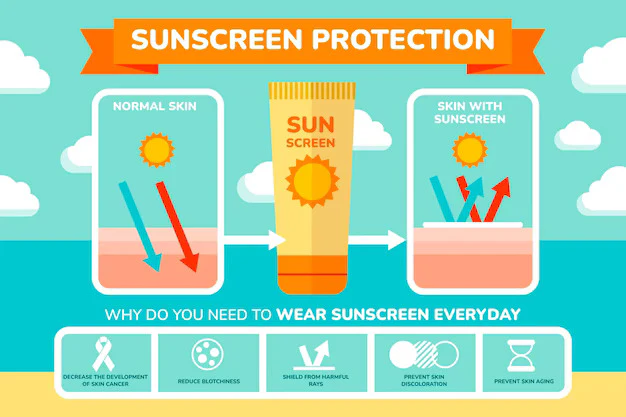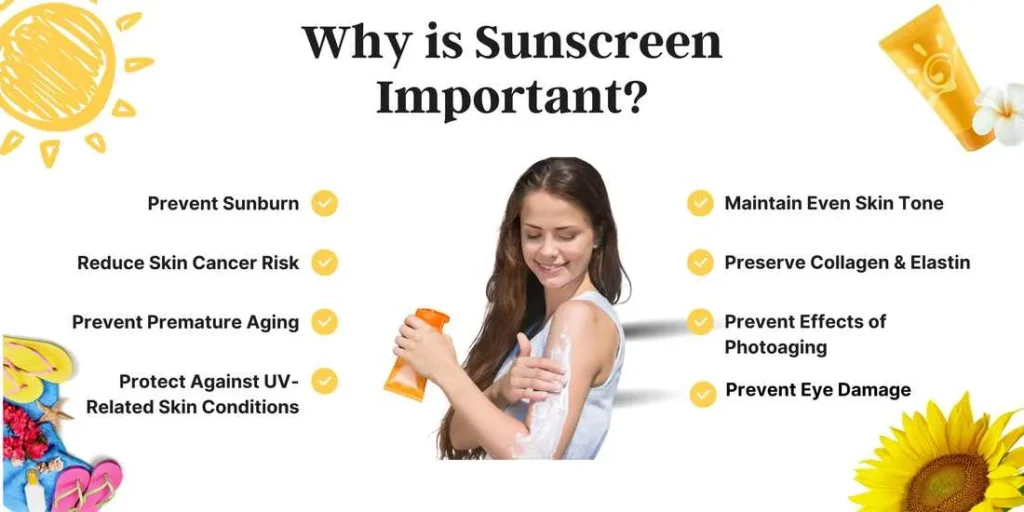Sunscreen is more than just an add-on in your skincare routine—it’s a vital step that can significantly impact your skin’s health and appearance. Despite its importance, many people either skip sunscreen or don’t apply it properly, leaving their skin exposed to harmful UV rays. These rays are the primary cause of premature aging, sunspots, and even skin cancer. Applying sunscreen daily, regardless of the weather, protects your skin from these risks and helps maintain a youthful, healthy complexion.
In this guide, we’ll explore why sunscreen is crucial for protecting your skin and provide tips on how to choose and apply it effectively.
Table of Contents
Why Should You Read This Article?
- Understand the Importance of Sunscreen: Learn how sunscreen protects your skin from immediate and long-term damage.
- Prevent Premature Aging: Discover how daily sunscreen use can keep your skin looking youthful by preventing wrinkles and sunspots.
- Reduce Skin Cancer Risk: Understand how sunscreen can lower your chances of developing skin cancer.
- Choose the Right Sunscreen: Get tips on selecting a sunscreen that suits your skin type and concerns.
- Apply Sunscreen Properly: Learn the correct way to apply sunscreen for maximum protection.
By the end of this article, you’ll have the knowledge to make informed decisions about sunscreen, ensuring your skin stays protected and healthy.

Why Sunscreen Is Essential for Skin Protection
Shield Against Harmful UV Rays
Sunscreen acts as a protective barrier against ultraviolet (UV) rays from the sun, which are a significant threat to your skin’s health. There are two main types of UV rays:
- UVA Rays: These rays penetrate deeply into the skin, contributing to premature aging by breaking down collagen and elastin fibers. Unlike UVB rays, UVA rays can penetrate through windows and clouds, making it essential to wear sunscreen even on cloudy days or indoors.
- UVB Rays: Responsible for sunburn, these rays are more intense during midday and can directly damage the DNA in skin cells, leading to skin cancer. UVB intensity varies with time of day, season, and location, but unprotected skin is always at risk.
- Broad-Spectrum Protection: A broad-spectrum sunscreen is vital because it shields your skin from both UVA and UVB rays, providing comprehensive protection against sun damage.
Prevents Premature Aging
Sun exposure is the leading cause of photoaging, which includes the development of wrinkles, fine lines, and sunspots. These signs of aging are often more pronounced in people who spend a lot of time in the sun without protection.
- Collagen Protection: UV rays accelerate the breakdown of collagen, a protein that keeps skin firm and youthful. Sunscreen helps prevent this damage, preserving your skin’s structure and reducing the appearance of sagging.
- Elastin Preservation: Elastin, another vital protein, helps skin maintain its shape and bounce. Regular sunscreen use preserves elastin, keeping your skin smooth and resilient, and minimizing the formation of fine lines and wrinkles.
- Prevention of Sunspots: Sunscreen also helps prevent the formation of sunspots, which are dark, pigmented areas that can make the skin look older.
Reduces the Risk of Skin Cancer
UV radiation is a major risk factor for skin cancer, including melanoma, the deadliest form. Daily application of sunscreen can significantly reduce your risk of developing skin cancer.
- Melanoma Prevention: Using a sunscreen with an SPF of 30 or higher has been shown to lower the risk of melanoma by blocking harmful UV rays before they can cause DNA damage.
- Protection for All Skin Types: While those with lighter skin are more prone to sunburn, people of all skin tones can develop skin cancer. Darker skin tones can still suffer from UV damage and are at risk for hyperpigmentation and melanoma, making sunscreen essential for everyone.
- Long-Term Health Benefits: Consistent sunscreen use not only reduces the immediate risk of sunburn but also lowers the chances of developing skin cancers in the future.
Prevents Sunburn and Hyperpigmentation
Sunburn is an immediate and painful sign of UV damage, leading to red, peeling skin that increases the risk of chronic damage and skin cancer. Hyperpigmentation, or dark spots caused by sun exposure, is another common issue that sunscreen can help prevent.
- Sunburn Prevention: Sunscreen, especially those with a high SPF, provides a protective shield against sunburn by blocking UVB rays. This protection is crucial for maintaining healthy skin and avoiding the pain and damage associated with burns.
- Hyperpigmentation Control: Consistent use of sunscreen helps prevent dark spots and uneven skin tone caused by UV-induced pigmentation. This is particularly important for those prone to discoloration or with existing hyperpigmentation issues.
- Reduction in Sun Sensitivity: For those with conditions like rosacea or other forms of sun sensitivity, sunscreen acts as a protective barrier, reducing flare-ups and irritation caused by sun exposure.
- Overall Skin Health: By preventing sunburn and hyperpigmentation, sunscreen helps maintain an even skin tone and a clear, bright complexion, contributing to the overall health and appearance of your skin.
Each of these points underscores the critical role sunscreen plays in a comprehensive skincare routine. It’s not just about preventing sunburn—sunscreen is essential for protecting your skin from long-term damage, keeping it youthful, even-toned, and healthy.

How to Choose and Apply Sunscreen Effectively
Choosing and applying sunscreen correctly is crucial for effective skin protection against harmful UV rays. Sunscreen is not just an optional step but a vital component of your skincare routine, helping to prevent skin damage, premature aging, and serious health risks like skin cancer. By understanding how to select the right product and applying it properly, you can significantly enhance your skin’s defense and maintain its health and radiance. Below are detailed guidelines to help you make the best choice and maximize the effectiveness of your sunscreen.
1. Choosing the Right Sunscreen
Selecting the appropriate sunscreen is the first step in safeguarding your skin. Consider the following factors:
- Broad-Spectrum Protection:
Always opt for a broad-spectrum sunscreen that offers protection against both UVA and UVB rays. UVA rays are responsible for aging and penetrating deeper layers of the skin, while UVB rays cause sunburn and can directly damage DNA. - SPF Rating:
The Sun Protection Factor (SPF) measures how well the sunscreen protects against UVB rays. An SPF of 30 or higher is recommended for daily use, providing adequate protection for most skin types. For extended outdoor activities, consider a higher SPF. - Formulation:
Choose a sunscreen formulation that suits your skin type:- Gel-Based: Ideal for oily or acne-prone skin as it is lightweight and non-greasy.
- Cream-Based: Suitable for dry skin, providing additional moisture.
- Hypoallergenic: Best for sensitive skin, with minimal irritants like fragrances or alcohol.
- Water Resistance:
If you’re planning to swim or sweat, opt for a water-resistant sunscreen. This ensures that your skin remains protected even in the presence of water or perspiration. Note that water resistance typically lasts for 40 to 80 minutes, so reapplication is necessary. - Active Ingredients:
Look for effective active ingredients:- Zinc Oxide or Titanium Dioxide: These are physical blockers that sit on the skin’s surface, reflecting UV rays.
- Avobenzone: A chemical blocker that absorbs UV radiation and transforms it into harmless heat.
2. Proper Application Techniques
Applying sunscreen correctly is just as important as choosing the right product. Here are the steps and tips to ensure you get the maximum protection:
- Amount:
The effectiveness of sunscreen largely depends on how much you apply. Use about a nickel-sized amount for your face and a shot glass amount (approximately 1 ounce) for your body. This ensures that every part of your skin is adequately covered. Don’t forget areas like your ears, neck, and the back of your hands. - Timing:
Apply sunscreen 15-30 minutes before sun exposure. This allows the product to fully absorb into your skin and form a protective barrier against UV rays. If you apply sunscreen right before going outside, it may not be as effective, especially if you start sweating immediately. - Reapplication:
Sunscreen wears off over time, especially with sweat, water exposure, or simply the passage of time. Reapply every two hours to maintain continuous protection. If you’re swimming or sweating heavily, reapply immediately after drying off, even if the sunscreen is water-resistant. - Daily Use:
Sunscreen isn’t just for sunny days. UV rays can penetrate clouds and glass, meaning your skin is still at risk indoors or on overcast days. Make sunscreen a daily habit to consistently protect your skin from potential damage. - Layering with Other Products:
Sunscreen should be the last step in your morning skincare routine. Apply it after your moisturizer to ensure it creates an effective barrier. If you use makeup, apply it after sunscreen, and consider a powder or setting spray with SPF for added protection.
3. Common Sunscreen Myths Debunked
There are many misconceptions about sunscreen that can lead to improper use. Let’s clear up some of these myths:
- Myth 1: “You only need sunscreen on sunny days.”
Reality:
UV rays are present year-round and can penetrate through clouds, meaning your skin is at risk even on cloudy or rainy days. Daily sunscreen use is essential to prevent cumulative damage. - Myth 2: “Darker skin tones don’t need sunscreen.”
Reality:
While darker skin tones have more melanin, which provides some natural protection, all skin tones can suffer from UV damage. This includes the risk of skin cancer, hyperpigmentation, and premature aging. Sunscreen is vital for everyone. - Myth 3: “Makeup with SPF is enough.”
Reality:
While it’s beneficial for makeup to contain SPF, it’s often not enough on its own. Most people don’t apply enough makeup to achieve the SPF level advertised. Use a dedicated sunscreen underneath your makeup to ensure full protection. - Myth 4: “Sunscreen lasts all day.”
Reality:
No sunscreen lasts all day, especially if you’re sweating, swimming, or spending extended periods in the sun. Reapplication every two hours is necessary to maintain effective protection throughout the day.
Conclusion
Using sunscreen is crucial for protecting your skin from UV damage and preventing premature aging and skin cancer. By choosing the right product—broad-spectrum with SPF 30 or higher—and applying it correctly, you can safeguard your skin from harmful rays and maintain a youthful complexion.
Key Points to Remember:
- Daily Use: Apply sunscreen every day, even when it’s cloudy.
- Right Product: Choose broad-spectrum sunscreen with SPF 30+ suited to your skin type.
- Proper Application: Use enough product and reapply every two hours or after swimming/sweating.
Integrating these practices into your skincare routine ensures you’re taking a significant step towards long-term skin health. Make sunscreen your daily habit for a healthier, more radiant complexion.
